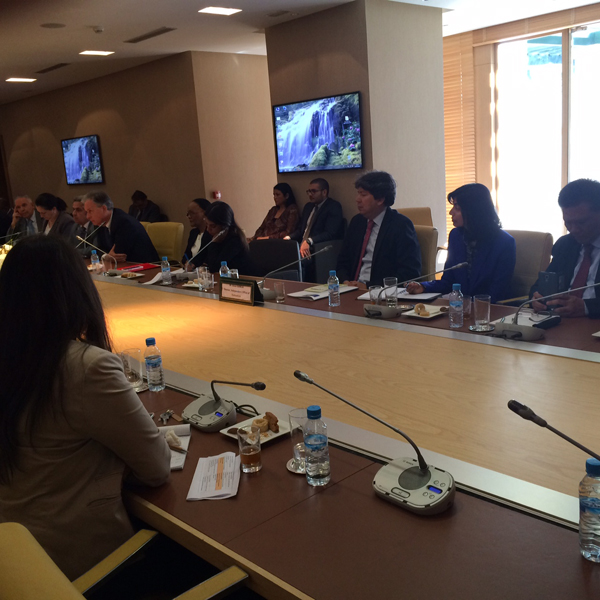More responsive evaluations needed to understand the nexus between environment and development - IOE
Rome, 1 March – “We need to evaluate the nexus between environment and development. It cannot be one or the other. We need to understand the unintended consequences of any development intervention”, affirmed Juha Ilari Uitto, Director of the Independent Evaluation Office (IEO) of the Global Environment Facility (GEF), during meeting at IFAD headquarters, in Rome, on 1 March.
Organized and hosted by the Independent Office of Evaluation of IFAD (IOE), the in-person knowledge exchange session provided an opportunity to discuss the role that evaluation can and should play in better understanding the nexus between human and natural ecosystems. In this context, Dr Uitto – who started his illustrious career as a Junior Professional Officer with IFAD, many years ago – presented the approach being taken by the GEF, broadly, and by GEF-IEO in particular.
“We need faster evaluation cycles, more responsive evaluations, more formative evaluations, real-time feedback, and more collaboration with programme proponents, without sacrificing independence which is crucial for credibility. We need to narrow down questions that we can answer more quickly. Not every evaluation needs to be a massive enterprise, that uses all DAC criteria”, emphasized Dr Uitto.
Moving from the well-documented premise that people and the environment interact in many complex manners, international organizations cannot continue doing development projects in a narrow silo, in a business as usual manner. The focus of attention must shift to researching how elements are interlinked, and how human and natural systems are connected. Luckily, there is plenty of existing evidence on these interlinkages from science and past studies, so we do not have to start from scratch.
“You can’t separate people from the environment, since virtually all root causes of environmental change are in the human domain”, further explained Dr Uitto.
Cognizant of the above, the GEF is now focusing its efforts on integration. The new GEF-8 strategy is built on the Healthy Planet, Healthy People framework, recognizing the interdependence between human wellbeing and a healthy environment. This is there to ensure that GEF investments are targeted toward tackling the breakdown in food, energy, urban, health, and natural systems that underpin human development. The Facility’s investment through integrated programs is not only to generate global environmental benefits, but also to create innovative pathways for transforming these systems toward durability and resilience.
To support these efforts, GEF-IEO conducts accountability and learning-focused evaluations that generate lessons learned for the GEF. The evaluations focus on results, impact and performance of the GEF, and address strategic issues of the partnership. The Office is responsible for undertaking independent evaluations that involve a set of projects and programs from more than one GEF Agency. These evaluations are typically at the strategic level, increasingly focusing on cross-cutting themes and the integrated programs. Institutional evaluations, such as assessing the resource allocation mechanism, or aspects of governance, are also undertaken.
For further information, please contact Alexander Voccia [here]
RESOURCES
- To access the new GEF-8 programming strategy, please click here.
- For more information on the GEF-IEO, please click here.
CONTACTS

